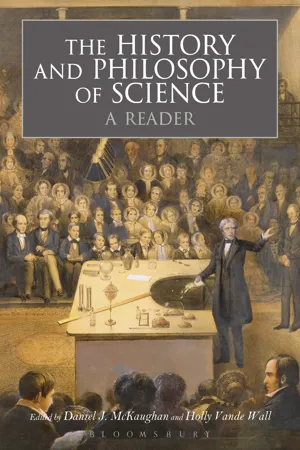
- 1,104 pages
- English
- PDF
- Available on iOS & Android
The History and Philosophy of Science: A Reader
About this book
The History and Philosophy of Science: A Reader brings together seminal texts from antiquity to the end of the nineteenth century and makes them accessible in one volume for the first time. With readings from Aristotle, Aquinas, Copernicus, Galileo, Descartes, Newton, Lavoisier, Linnaeus, Darwin, Faraday, and Maxwell, it analyses and discusses major classical, medieval and modern texts and figures from the natural sciences. Grouped by topic to clarify the development of methods and disciplines and the unification of theories, each section includes an introduction, suggestions for further reading and end-of-section discussion questions, allowing students to develop the skills needed to: § read, interpret, and critically engage with central problems and ideas from the history and philosophy of science
§ understand and evaluate scientific material found in a wide variety of professional and popular settings
§ appreciate the social and cultural context in which scientific ideas emerge
§ identify the roles that mathematics plays in scientific inquiry Featuring primary sources in all the core scientific fields - astronomy, physics, chemistry, and the life sciences - The History and Philosophy of Science: A Reader is ideal for students looking to better understand the origins of natural science and the questions asked throughout its history. By taking a thematic approach to introduce influential assumptions, methods and answers, this reader illustrates the implications of an impressive range of values and ideas across the history and philosophy of Western science.
Frequently asked questions
- Essential is ideal for learners and professionals who enjoy exploring a wide range of subjects. Access the Essential Library with 800,000+ trusted titles and best-sellers across business, personal growth, and the humanities. Includes unlimited reading time and Standard Read Aloud voice.
- Complete: Perfect for advanced learners and researchers needing full, unrestricted access. Unlock 1.4M+ books across hundreds of subjects, including academic and specialized titles. The Complete Plan also includes advanced features like Premium Read Aloud and Research Assistant.
Please note we cannot support devices running on iOS 13 and Android 7 or earlier. Learn more about using the app.
Information
Table of contents
- Title
- Copyright
- Contents
- Acknowledgments
- Introduction
- Part I The Birth of Natural Philosophy: Science and Mathematics in the Ancient Hellenistic World
- Part II Translation, Appropriation, and Critical Engagement: Science in the Roman and Medieval Islamic and European Worlds
- Part III Revolutions in Astronomy and Mechanics: From Copernicus to Newton
- Part IV Investigating the Invisible: Light, Electricity, and Magnetism
- Part V Elements in Transition: Chemistry, Air, Atoms, and Heat
- Part VI The Earth and All Its Creatures: Developments in Geology and Biology
- Part VII The Emergence of Evolution: Darwin and His Interlocutors
- Bibliography
- Index